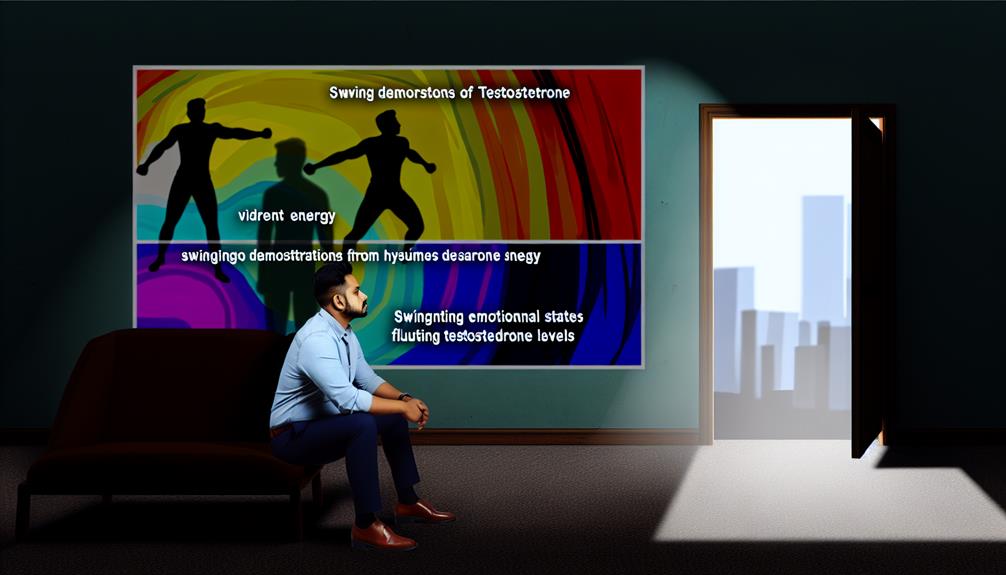Men's mental health is markedly affected by hormonal changes, mainly testosterone, cortisol, and serotonin. I've found that fluctuations in testosterone can lead to irritability, fatigue, and even depression. Cortisol, often known as the stress hormone, disrupts mood and can exacerbate anxiety when levels are chronically elevated. Additionally, serotonin plays an essential role in regulating mood, as low levels are often linked to sadness and irritability. Understanding these hormonal shifts can be critical in addressing emotional well-being and fostering resilience. If you're curious about how these factors intertwine with lifestyle and support, there's more to uncover.
Testosterone Levels and Mood

While we often think of testosterone primarily in relation to physical health, its influence on mood and mental well-being is equally significant. I've noticed that fluctuations in testosterone levels can lead to mood swings that are often dismissed as just part of life. However, these swings can be deeply tied to hormonal balance, which is essential for emotional stability.
In my experience, testosterone therapy can play an important role in regulating mood and enhancing mental resilience. When testosterone levels fall below a certain threshold, I've observed that individuals often experience irritability, fatigue, and a general sense of sadness. This isn't just a coincidence; research supports the idea that testosterone is fundamental for effective mood regulation.
As I explore this topic, it becomes clear that maintaining ideal testosterone levels is not just about physical health, but about emotional well-being too. When testosterone levels are restored through therapy, many report a significant improvement in mood stability. This doesn't mean that testosterone is a cure-all, but it can be a key component in a broader strategy for mental health.
Understanding the relationship between testosterone and mood can empower us to seek help when needed. It's important to recognize that addressing hormonal balance can lead to more than just physical improvements; it can also foster emotional stability and enhance overall quality of life. Balancing hormones isn't just a medical issue—it's a pathway to a healthier, more balanced emotional self.
The Role of Cortisol
Testosterone isn't the only hormone that greatly impacts mood; cortisol, often referred to as the stress hormone, plays a significant role in mental health as well. As I navigate the complexities of cortisol regulation, I find it essential to understand how our bodies respond to stress. When faced with anxiety triggers, cortisol is released from the adrenal glands, initiating a stress response that can affect both emotional stability and mental resilience.
In short bursts, elevated cortisol levels can enhance focus and energy, but chronic stress leads to persistent high cortisol levels, resulting in mood fluctuations and a diminished sense of well-being. This prolonged exposure to cortisol can impair adrenal function, further complicating the hormonal feedback loop necessary for maintaining balance.
I've noticed that individuals with chronic stress often experience heightened anxiety, which may stem from their bodies' inability to regulate cortisol effectively. This dysregulation can leave us feeling overwhelmed, impacting our emotional health and overall mental state. It's important to recognize that while some level of cortisol is necessary for survival, excessive amounts can lead to detrimental effects on our mental health.
Understanding the role of cortisol in our lives can empower us to seek strategies for better stress management. By addressing cortisol levels through lifestyle changes, such as regular exercise and mindfulness practices, we can foster emotional stability and enhance our mental resilience. Ultimately, managing cortisol effectively is a fundamental step toward achieving improved mental health.
Serotonin and Emotional Well-Being

As I explore the role of serotonin in emotional well-being, I can't help but notice its profound impact on mood regulation. It's fascinating how fluctuations in serotonin levels can greatly influence anxiety levels, either exacerbating or alleviating them. Understanding this connection is essential for addressing men's mental health in the context of hormonal changes.
Serotonin's Role in Mood
Understanding the intricate relationship between serotonin and mood is vital for anyone invested in mental health, particularly for men steering through hormonal fluctuations. Serotonin, often dubbed the "feel-good" neurotransmitter, greatly influences emotional well-being and mood stability. Its synthesis occurs in the brain and intestines, primarily from the amino acid tryptophan. This process can be affected by various factors, including diet, stress, and hormonal changes.
When serotonin levels fluctuate, it impacts the activation of serotonin receptors, which play a significant role in regulating mood and emotional responses. Low serotonin levels can lead to feelings of sadness, irritability, and even depression, while ideal levels support a more balanced emotional state.
It's important to recognize that serotonin isn't acting alone; it interacts with various other neurotransmitters and hormones. As a result, understanding these dynamics can empower men to take proactive steps toward improving their emotional health. Simple changes like diet adjustments, regular exercise, and mindfulness practices can positively influence serotonin synthesis and receptor activity. By being aware of these mechanisms, you're better equipped to navigate the complexities of mood regulation in the face of hormonal changes.
Impact on Anxiety Levels
How do fluctuations in serotonin levels contribute to anxiety? Low serotonin can lead to heightened anxiety levels, as this neurotransmitter plays a essential role in emotional regulation. I've noticed that hormonal triggers, like stress or changes in lifestyle, can disrupt serotonin production, leading to stress responses that feel overwhelming. These fluctuations often result in mood swings, leaving me feeling emotionally unstable.
In managing anxiety, it's important to adopt effective coping strategies. I've found that maintaining a balanced diet, engaging in regular physical activity, and practicing mindfulness can help stabilize serotonin levels. These strategies not only improve my mood but also enhance my mental resilience against anxiety's psychological effects.
Understanding the connection between serotonin and anxiety has been enlightening. It's clear that by addressing hormonal triggers and focusing on emotional regulation, I can better manage my anxiety. This journey has taught me that while I can't always control external stressors, I can influence my internal environment through positive lifestyle changes. Ultimately, developing awareness of how these hormonal changes affect my mental health empowers me to take proactive steps toward a more balanced emotional state.
Age-Related Hormonal Changes
As men age, I've noticed that testosterone levels often decline, which can greatly affect mood, energy, and overall mental health. Additionally, rising estrogen levels can further complicate this hormonal landscape, leading to emotional fluctuations that are hard to manage. Understanding these changes is vital for addressing the mental health challenges many men face as they grow older.
Testosterone Decline Effects
While aging is a natural process that affects us all, the decline in testosterone levels can have profound implications for men's mental health. As I reflect on this issue, I recognize that lower testosterone often correlates with increased feelings of fatigue, irritability, and even depression. These changes can affect not only emotional well-being but also cognitive function, leading to difficulties in concentration and memory.
Men experiencing significant testosterone decline might consider testosterone therapy as a viable option. Hormone replacement therapy can help restore testosterone levels, potentially alleviating some of the mental health challenges associated with aging. However, it's essential to approach this treatment cautiously, as individual responses can vary widely. I've seen that while some men report significant improvements in mood and energy levels after starting therapy, others may not experience the same benefits or may encounter side effects.
Ultimately, acknowledging the effects of testosterone decline is vital for fostering a supportive environment. It's important to have open discussions with healthcare providers about mental health and consider appropriate interventions, including hormone replacement, that can enhance quality of life as we age.
Estrogen Levels Influence
A significant aspect of age-related hormonal changes in men is the often-overlooked influence of estrogen levels. As men age, their testosterone levels decline, sometimes leading to estrogen dominance. This shift can profoundly affect mental health, resulting in heightened emotional sensitivity and mood fluctuations.
I've seen firsthand how these hormonal changes create an imbalance that can affect daily life. Consider the following:
- Increased irritability over minor issues, feeling like a volcano ready to erupt
- Unexplained sadness or anxiety, as if a cloud looms overhead
- Difficulty focusing, like trying to see through foggy glasses
When estrogen levels rise disproportionately, it can lead to a lack of hormonal balance, creating a cascade of emotional challenges. Many men may not even recognize these symptoms as linked to hormonal changes, attributing them instead to stress or aging.
Understanding the connection between estrogen and mental health is essential. Adopting lifestyle changes or seeking medical advice can help restore hormonal balance and improve emotional well-being. By acknowledging these influences, we can better navigate the complexities of aging and mental health.
Stress and Hormonal Imbalance

Under the weight of daily pressures, many men experience stress that can lead to significant hormonal imbalances. I've observed that various hormonal stressors, such as work demands, financial worries, or relationship issues, can disrupt the finely tuned hormonal system in men. When stress levels rise, the body responds by producing higher amounts of cortisol, the primary stress hormone. While cortisol plays a vital role in managing stress, chronic elevation can wreak havoc on other hormones, including testosterone.
This imbalance doesn't just affect physical health; it has profound implications for mental health as well. I've seen how low testosterone levels, often linked to heightened stress, can contribute to symptoms of depression and anxiety. Men may find themselves struggling with mood swings, irritability, or a lack of motivation, further exacerbating feelings of stress. This cyclical nature of stress and hormonal imbalance can erode mental resilience, making it harder to cope with the challenges life throws our way.
Recognizing the interplay between stress and hormones is essential. By understanding how our bodies react to stressors, we can take proactive steps to mitigate these effects. Whether it's through stress management techniques, physical activity, or seeking professional help, regaining control over our hormonal health can be a pivotal step in restoring mental well-being. It's important for men to acknowledge these changes and seek support, as doing so can ultimately lead to a more balanced, fulfilling life.
Impact of Diet on Hormones
Diet plays an essential role in regulating hormonal balance, and I've seen firsthand how the foods we consume can profoundly affect our hormonal health. The connection between what we eat and our hormonal state is intricate, influencing not just our physical well-being but also our mental health. Nutritional choices can either support or disrupt our hormonal equilibrium, making it vital to prioritize effective nutrition strategies.
When I reflect on the impact of diet, I often think of:
- Nutrient-rich foods that support gut health
- The timing of meals and its role in hormonal regulation
- The dangers of processed foods that can lead to inflammation and micronutrient deficiencies
In my experience, dietary nutrients like omega-3 fatty acids, vitamins, and minerals play pivotal roles in maintaining hormonal balance. For instance, healthy fats can help reduce inflammation, while a lack of essential micronutrients can lead to hormonal disruptions, amplifying stress and anxiety. Furthermore, meal timing can greatly influence insulin levels, which directly affect mood and energy.
It's also important to take into account lifestyle factors that interact with our food choices. Stress management, sleep quality, and physical activity all intersect with diet, creating a holistic picture of hormonal health. By being mindful of what we eat, we can take proactive steps towards optimizing our hormonal balance, ultimately enhancing our mental well-being. Embracing whole, minimally processed foods can be a game-changer in this journey.
Exercise and Mental Health

Maintaining a balanced hormonal state isn't just about nutrition; exercise plays a vital role in shaping both our physical and mental health. As I've explored the intricate relationship between physical activity and hormonal balance, it's clear that regular exercise offers profound benefits that extend beyond muscle and endurance.
Engaging in consistent physical activity stimulates the release of endorphins, often referred to as "feel-good" hormones. These endorphins can greatly enhance mood and reduce symptoms of anxiety and depression. Personally, I've noticed that even short bursts of exercise can lead to a noticeable improvement in my mental clarity and overall emotional state.
Moreover, exercise can regulate hormones like cortisol, which is linked to stress management. High cortisol levels can wreak havoc on both our mental health and hormonal equilibrium. By incorporating routine physical activity, I've found that I can keep my stress responses in check, fostering a sense of calm and stability.
Additionally, the discipline of adhering to an exercise regimen can foster a sense of achievement and self-worth, which is essential for maintaining mental health. Each workout becomes an indicator of my commitment to well-being, reinforcing positive self-perceptions.
Sleep Patterns and Hormonal Fluctuations
As I often reflect on my own sleep patterns, it becomes evident that they play an essential role in hormonal fluctuations and overall mental health. Disrupted sleep can greatly affect hormonal regulation, especially in men, causing alterations in testosterone levels and cortisol production. These changes can lead to mood swings, anxiety, and even depression.
To better understand this connection, I often consider the following aspects of sleep hygiene:
- Consistent sleep schedule: Going to bed and waking up at the same time daily can stabilize hormonal cycles.
- Sleep environment: A dark, cool, and quiet space encourages deeper sleep, promoting better hormonal balance.
- Limiting screen time: Reducing exposure to screens before bedtime can improve melatonin production, aiding restful sleep.
When I prioritize sleep hygiene, I notice a marked improvement in my mood and cognitive function. On the contrary, when I neglect it, I can feel the repercussions in my emotional state. The intricate relationship between sleep and hormonal regulation cannot be overstated. Poor sleep not only disrupts hormone levels but can also perpetuate a cycle of mental health challenges.
Seeking Professional Help

Steering through the complexities of mental health can often feel overwhelming, particularly when hormonal changes complicate the landscape. I understand that seeking professional help can seem intimidating, but it's a significant step in addressing the emotional turmoil linked to these fluctuations. The right therapy options can provide a structured environment for exploring your feelings and challenges. Cognitive-behavioral therapy, for instance, can help reframe negative thought patterns that arise during hormonal shifts.
It's essential to remember that therapy isn't a one-size-fits-all solution. Different approaches resonate with different individuals, and it may take time to find what works best for you. I encourage you to be patient with the process.
Moreover, support networks play an important role in this journey. Connecting with friends, family, or support groups can provide a sense of belonging and understanding. Sharing your experiences with others who face similar challenges can alleviate feelings of isolation.
Professional help doesn't only mean therapy; it can include consulting with a healthcare provider to discuss hormonal imbalances. These professionals can guide you towards appropriate treatments or lifestyle changes that may ease symptoms impacting your mental health.
Ultimately, seeking help is an act of strength. By taking this step, you're prioritizing your well-being and opening the door to healing and resilience. Remember, you don't have to navigate this journey alone; support is available, and it's okay to reach out for it.
Frequently Asked Questions
How Do Hormonal Changes Affect Men's Relationships and Social Interactions?
I've noticed that hormonal changes can greatly impact relationship dynamics and social interactions. For instance, fluctuations in hormones can lead to increased social anxiety, making it harder to maintain friendship bonds. This often affects emotional intimacy and alters communication styles, causing misunderstandings. Without strong support networks, men may feel isolated, which further complicates their ability to connect. Understanding these influences can help us navigate our relationships more effectively and empathetically.
Can Hormonal Fluctuations Lead to Increased Aggression in Men?
Did you know that about 20% of men experience increased aggression during periods of fluctuating testosterone levels? I've found that these hormonal changes can act as aggression triggers, impacting emotional regulation. Societal expectations often pressure men to conform to aggressive norms, making it harder to express vulnerability. It's essential to understand how these fluctuations affect behavior, as they can lead to misunderstandings in relationships and contribute to broader mental health challenges.
What Lifestyle Habits Can Worsen Hormonal Imbalances in Men?
When considering lifestyle habits that can worsen hormonal imbalances in men, I've noticed that poor dietary choices and lack of exercise routines play significant roles. Consuming high amounts of processed foods and sugars can disrupt hormonal levels, while insufficient physical activity can lead to weight gain and further hormonal issues. I've found that prioritizing balanced nutrition and regular exercise not only boosts my mood but also helps maintain healthier hormone levels overall.
Are There Genetic Factors Influencing Hormonal Changes in Men's Mental Health?
Did you know that about 30% of men may have a genetic predisposition that affects hormonal regulation? I find it fascinating how our genes can influence not just our physical health but also our mental well-being. These genetic factors can lead to variations in hormone levels, potentially impacting mood and cognitive function. Understanding this interplay helps me appreciate the complexity of men's mental health, highlighting the need for personalized approaches in treatment and support.
How Does Substance Abuse Impact Men's Hormonal Health and Mental Well-Being?
Substance dependence can markedly disrupt a man's hormonal health, leading to hormonal imbalance that negatively affects mental well-being. I've seen how alcohol and drugs can lower testosterone levels, increasing anxiety and depression. It's a vicious cycle—substance abuse worsens mental health, which may lead to further substance reliance. Understanding this relationship is essential; addressing both substance use and hormonal health can pave the way for recovery and improved emotional stability.
